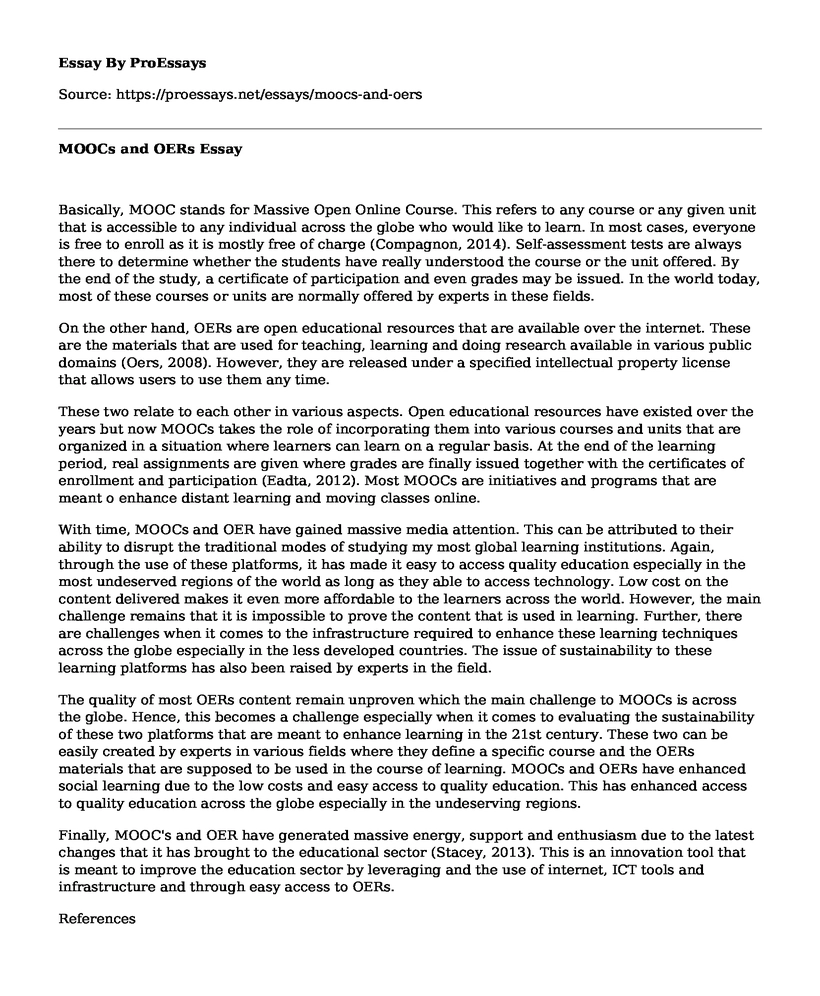Basically, MOOC stands for Massive Open Online Course. This refers to any course or any given unit that is accessible to any individual across the globe who would like to learn. In most cases, everyone is free to enroll as it is mostly free of charge (Compagnon, 2014). Self-assessment tests are always there to determine whether the students have really understood the course or the unit offered. By the end of the study, a certificate of participation and even grades may be issued. In the world today, most of these courses or units are normally offered by experts in these fields.
On the other hand, OERs are open educational resources that are available over the internet. These are the materials that are used for teaching, learning and doing research available in various public domains (Oers, 2008). However, they are released under a specified intellectual property license that allows users to use them any time.
These two relate to each other in various aspects. Open educational resources have existed over the years but now MOOCs takes the role of incorporating them into various courses and units that are organized in a situation where learners can learn on a regular basis. At the end of the learning period, real assignments are given where grades are finally issued together with the certificates of enrollment and participation (Eadta, 2012). Most MOOCs are initiatives and programs that are meant o enhance distant learning and moving classes online.
With time, MOOCs and OER have gained massive media attention. This can be attributed to their ability to disrupt the traditional modes of studying my most global learning institutions. Again, through the use of these platforms, it has made it easy to access quality education especially in the most undeserved regions of the world as long as they able to access technology. Low cost on the content delivered makes it even more affordable to the learners across the world. However, the main challenge remains that it is impossible to prove the content that is used in learning. Further, there are challenges when it comes to the infrastructure required to enhance these learning techniques across the globe especially in the less developed countries. The issue of sustainability to these learning platforms has also been raised by experts in the field.
The quality of most OERs content remain unproven which the main challenge to MOOCs is across the globe. Hence, this becomes a challenge especially when it comes to evaluating the sustainability of these two platforms that are meant to enhance learning in the 21st century. These two can be easily created by experts in various fields where they define a specific course and the OERs materials that are supposed to be used in the course of learning. MOOCs and OERs have enhanced social learning due to the low costs and easy access to quality education. This has enhanced access to quality education across the globe especially in the undeserving regions.
Finally, MOOC's and OER have generated massive energy, support and enthusiasm due to the latest changes that it has brought to the educational sector (Stacey, 2013). This is an innovation tool that is meant to improve the education sector by leveraging and the use of internet, ICT tools and infrastructure and through easy access to OERs.
References
Compagnon, A. (2014). MOOCS [Massive open online courses] et vaches a lait. (Le Debat, 20143, 180, 170-178.)
Eadtu, D. (2012). Distant Learning Portal: MOOCs Online Education for the Masses. Retrieved from: http://www.distancelearningportal.com/articles/241/moocs-online-education-for-the-masses.html
Oers, B. . (2008). The transformation of learning: Advances in cultural-historical activity theory. New York: Cambridge University Press.
Stacey, P, (2013). The Pedagogy of MOOCs. Retrieved from: http://edtechfrontier.com/2013/05/11/the-pedagogy-of-moocs/
Cite this page
MOOCs and OERs. (2021, Mar 06). Retrieved from https://proessays.net/essays/moocs-and-oers
If you are the original author of this essay and no longer wish to have it published on the ProEssays website, please click below to request its removal:
- Promoting Health and Wellness in Children Essay
- Development of High School Mathematics Teachers
- Children Left Behind: Effects of Incarceration on Children Paper Example
- Prudent Decision-Making Paper Example
- Essay Sample on Pedagogy in Arabic Class
- Essay Example on Children and Mobile Phones: Impact of Globalization & Technology
- Understanding External Triggers and Psychological Effects of Electronic Addiction - Free Report







